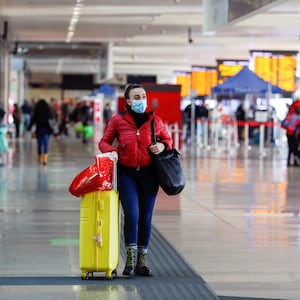ROME—As hospitals and morgues start to fill up again, Europe is once again heading for another COVID-19 winter from hell. But rather than waiting until things get too far out of control, many countries are taking precautionary measures now, with lockdowns and vaccine mandates, in order to try to save the Christmas holidays. The U.S., which has recently reopened travel to Europeans and where just over 68 percent of the total population are fully inoculated, might take note because there is little question that the next wave is on its way.
Austria and the Netherlands are both instituting modified national lockdowns—for the vaccinated and unvaccinated alike—to try to avoid what’s happening in Germany, where new daily infections now top 65,000.
In Austria, where vaccination rates are below 64 percent, a lockdown for unvaccinated this week will be extended to include everyone starting Monday. The government also announced Friday that anti-COVID vaccines are soon to be mandatory for the entire population—the strictest rule yet in Europe. “This is a dramatic step,” Chancellor Alexander Schallenberg said Friday. “In the long term, the way out of this vicious circle we are in—and it is a vicious circle, we are stumbling from wave to lockdown, and that can't carry on ad infinitum—is only vaccination.”
Only 60 percent of those in Western Europe are fully vaccinated, according to European health authorities, and of those, only a small percentage have been offered a booster, which has led to the current threat. Spain, Italy, and France are leading the way and offering boosters now to most of the general population six months after their last shot in an attempt to stop the unvaccinated from spreading the virus to those with waning immunity.
The World Health Organization has warned that deaths related to COVID-19 across Europe are now rising at a rate of about 5 percent a week, bucking global trends where high caseloads do not necessarily translate to more deaths.
Germany, which has a vaccine rate of 67 percent, is entering a state of emergency, with tough restrictions now on the table. “We are currently heading toward a serious emergency,” Lothar Wieler, director of Germany’s disease control agency said Thursday. “We are going to have a really terrible Christmas if we don't take countermeasures now.” Measures in place include proof of vaccination, recovery from COVID, or a negative swab test to enter most leisure venues. New restrictions could extend that to workplaces.
In Italy, where 84 percent of the population are fully vaccinated and which was the hardest hit when the pandemic first jumped from China, vaccines or a negative COVID test are required for anyone to go to work, dine indoors, or travel any long distance by train or bus. Italy has never lifted its mask mandate for all indoor spaces, and while numbers are slowly inching up—topping 10,000 new cases a day for three days running—health authorities say the situation is still under control. They will follow a three-tier formula for restrictions. Four provinces in the north of the country face yellow zone restrictions, health authorities said Friday, which will make mask-wearing compulsory outdoors as well as indoors and which will limit indoor dining to four people at a table.
In Ireland, where 90 percent of the population over the age of 12 is fully vaccinated, measures will go into effect encouraging people to work from home when possible and making it mandatory for people to show a COVID-19 pass that they are vaccinated or recovered, for cinemas and theaters. Entertainment venues will also have to close at midnight.
Belgium, where hospitalization rates have been growing by 30 percent a week, will also require people to work from home at least four days a week from Nov. 22 to try to stop the spread of the virus. The country is also introducing a mask mandate for all public places, which replaces the previous vaccination pass to exempt people from wearing masks at venues with more than 50 people indoors or 100 outdoors. The country will also start vaccinating children between the ages of 5 and 11.
France, where 76 percent of the population are fully vaccinated, has seen case numbers rise but hospitalizations and deaths remain steady. The country will require booster shots for everyone over 65 by mid-December or their health pass that allows them to enter restaurants and other entertainment venues will be canceled. “We are holding up better today than other countries not only because our vaccination coverage is higher and the booster shot is progressing, but also because we implemented the health pass very early on,” Health Ministry spokesman Gabriel Attal said. “There are nine times more critical care admissions and deaths among the unvaccinated than among the vaccinated.”
The U.K., which has a vaccination rate of about 68 percent of the total population, has seen fewer hospitalizations and deaths as numbers inch up in line with continental Europe. “I am seeing the storm clouds gathering over parts of the European continent,” Prime Minister Boris Johnson warned. “We have been here before and we remember what happens when a wave starts rolling in.”







